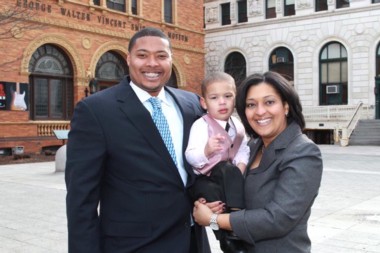Of the kids he grew up with in Springfield, Justin Hurst estimates that about one-third left the city for college or work and never returned, either settling down in another part of the state or country or, if they ended up with a job in Springfield, living outside the city. Another third, he said, stayed in the city, not by choice, but because they lacked access to higher education or other opportunities that led so many of their peers elsewhere.
The final third, Hurst said, were people like himself: those who benefited from things like involved parents and educational opportunities but chose to stay in Springfield, or to return there after some time away. In his case, that meant going to college in Virginia, then coming home to Springfield to attend law school, teach English at the High School of Science and Technology, start a family and, as of this month, serve on the City Council. (His wife, Denise Hurst, sits on the Springfield School Committee.)
Hurst, a proud alum of the Springfield public schools, said it was important to him to “to come back and give to this city that gave so much.” And he’d like to see more people make that same decision.
“Young people are crucial to a city that looks to grow from an economic standpoint,” said Hurst, whose City Council campaign emphasized the need for more young families to settle in the city. “In order to have a vibrant Springfield, with a sense of pride, I think we need to continue to attract families who want to settle down here and enjoy the rich benefits this city has to offer.”
Hurst hopes to help advance that cause in his role as chair of the City Council’s ad-hoc Young Professional Committee. One of several new committees established by the Council’s recently elected president, Ward 2 Councilor Mike Fenton, the body was created to find ways to attract young professionals to the city and retain its young people who might otherwise leave.
How it achieves that goal remains, by design, to be determined. Both Hurst and Fenton emphasized that the committee, which will include members from the general public, will be encouraged to develop and pursue its own ideas, rather than carry out specific charges from the Council. The committee will also look to cities that have healthy young professional communities for ideas, Hurst said.
Fenton and Hurst are now reviewing applications to serve on the committee. Hurst said he hopes to hold its first meeting in February and plans to have a public speak-out time at the start of each meeting.
Like Hurst, Fenton—a 27-year-old attorney who grew up in Hungry Hill—watched many of his friends leave the city when they became old enough. “They’re in Boston, they’re in New York City, they’re in Washington, D.C.,” he said. “And the ones that never lived here don’t want to come.”
Fenton listed a number of issues he’d like to see the committee look at: identifying, marketing and, if necessary, improving first-time homebuyer programs like those offered by a number of the big non-profit employers in the city. Taking advantage of the increased activity that will come with the new UMass satellite campus at Tower Square, which is set to begin offering classes in the fall. Expanding market-rate housing in the city’s downtown, which Fenton called “the golden goose that has eluded us for 50 years since the disaster of urban renewal,” and making that area “a cool place to live.”
“I think there’s a desire for young people to have an urban environment to live in. They like low-maintenance: condos, apartments, bars and restaurants [nearby],” Fenton said. He also suggested some smaller fixes that could make downtown more attractive to young people, from bike lanes to parking meters that accept cards instead of coins. “It doesn’t seem on the face of it a young professional [issue], but it is,” he said. “We don’t carry cash. I don’t carry quarters.”
Bringing more young people to downtown would help improve the overall environment there, including countering perceptions that it’s unsafe. “If we have foot traffic in downtown, that will change Springfield forever, period. That’s the key,” Fenton said. “Young professionals are the ones creating that foot traffic.”
One of the biggest challenges the effort faces is retaining young families when their children reach school age. While the graduation rate in the city schools has shown steady improvement in recent years, it still remains low—56.6 percent in 2012, compared to the statewide rate of 84.7 percent—as do other measures of school success, such as MCAS scores.
“That’s obviously a young professional issue,” said Fenton, who’s seen friends and relatives sell their homes and leave the city rather than send their kids to the public schools. “We need to make sure our school system is more vibrant and better, and I think we’re getting there under this superintendent.” Families also need to be made aware of the range of educational options available, including Springfield’s well-regarded magnet and charter schools as well as private school options, added Fenton, an alumnus of Cathedral High.
Hurst said he expects the Young Professional Committee to take up a mix of long-range projects— “some ideas that are lofty, that will possibly require some lobbying at the state level, some lobbying of the mayor; some big funding ideas that might not happen right away”—and smaller ideas that can be executed quickly. “People like to see those short successes,” he said.
Does Hurst have any pet projects he’d like to see the committee take on? “Yes and no,” he said; while he has some ideas in mind, he’d like to focus on putting into action good ideas from committee members and the public. But, he added, “my wife has tons of ideas.”•



